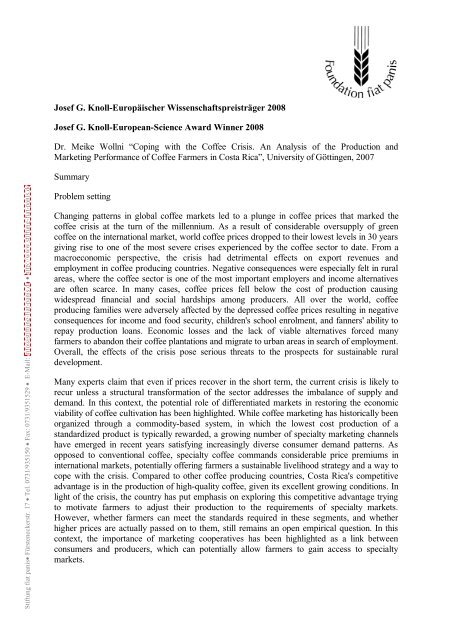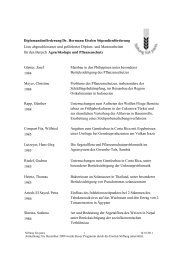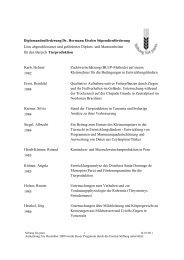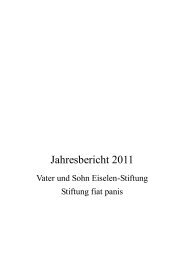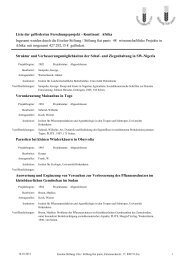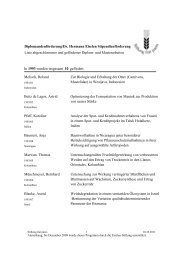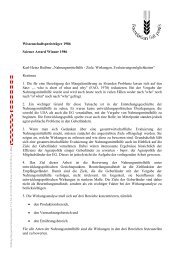Josef G. Knoll-Europäischer ... - Stiftung Fiat Panis
Josef G. Knoll-Europäischer ... - Stiftung Fiat Panis
Josef G. Knoll-Europäischer ... - Stiftung Fiat Panis
You also want an ePaper? Increase the reach of your titles
YUMPU automatically turns print PDFs into web optimized ePapers that Google loves.
<strong>Josef</strong> G. <strong>Knoll</strong>-Europäischer Wissenschaftspreisträger 2008<br />
<strong>Josef</strong> G. <strong>Knoll</strong>-European-Science Award Winner 2008<br />
Dr. Meike Wollni “Coping with the Coffee Crisis. An Analysis of the Production and<br />
Marketing Performance of Coffee Farmers in Costa Rica”, University of Göttingen, 2007<br />
Summary<br />
<strong>Stiftung</strong> fiat panis Fürsteneckerstr. 17 Tel. 0731/935150 Fax: 0731/9351529 E-Mail: info@stiftung-fiat-panis.de http://www.stiftung-fiat-panis.de<br />
Problem setting<br />
Changing patterns in global coffee markets led to a plunge in coffee prices that marked the<br />
coffee crisis at the turn of the millennium. As a result of considerable oversupply of green<br />
coffee on the international market, world coffee prices dropped to their lowest levels in 30 years<br />
giving rise to one of the most severe crises experienced by the coffee sector to date. From a<br />
macroeconomic perspective, the crisis had detrimental effects on export revenues and<br />
employment in coffee producing countries. Negative consequences were especially felt in rural<br />
areas, where the coffee sector is one of the most important employers and income alternatives<br />
are often scarce. In many cases, coffee prices fell below the cost of production causing<br />
widespread financial and social hardships among producers. All over the world, coffee<br />
producing families were adversely affected by the depressed coffee prices resulting in negative<br />
consequences for income and food security, children's school enrolment, and fanners' ability to<br />
repay production loans. Economic losses and the lack of viable alternatives forced many<br />
farmers to abandon their coffee plantations and migrate to urban areas in search of employment.<br />
Overall, the effects of the crisis pose serious threats to the prospects for sustainable rural<br />
development.<br />
Many experts claim that even if prices recover in the short term, the current crisis is likely to<br />
recur unless a structural transformation of the sector addresses the imbalance of supply and<br />
demand. In this context, the potential role of differentiated markets in restoring the economic<br />
viability of coffee cultivation has been highlighted. While coffee marketing has historically been<br />
organized through a commodity-based system, in which the lowest cost production of a<br />
standardized product is typically rewarded, a growing number of specialty marketing channels<br />
have emerged in recent years satisfying increasingly diverse consumer demand patterns. As<br />
opposed to conventional coffee, specialty coffee commands considerable price premiums in<br />
international markets, potentially offering farmers a sustainable livelihood strategy and a way to<br />
cope with the crisis. Compared to other coffee producing countries, Costa Rica's competitive<br />
advantage is in the production of high-quality coffee, given its excellent growing conditions. In<br />
light of the crisis, the country has put emphasis on exploring this competitive advantage trying<br />
to motivate farmers to adjust their production to the requirements of specialty markets.<br />
However, whether farmers can meet the standards required in these segments, and whether<br />
higher prices are actually passed on to them, still remains an open empirical question. In this<br />
context, the importance of marketing cooperatives has been highlighted as a link between<br />
consumers and producers, which can potentially allow farmers to gain access to specialty<br />
markets.
- 2 –<br />
Objectives<br />
The main objective of this study is to analyze the effects of the coffee crisis on the Costa Rican<br />
coffee sector, particularly on producers, and to identify the factors that influence production and<br />
marketing performance of coffee farmers. Based on the analysis, policy recommendations are<br />
derived that should help farmers to improve their competitiveness and their ability to cope with<br />
the crisis. The overall aim can be broken down into several specific objectives addressed by this<br />
research:<br />
- To analyze the organization, coordination and performance of the Costa Rican coffee<br />
sector with special regard to the changes that have been induced by the coffee crisis;<br />
- To describe the coffee production and marketing activity of farmers in Costa Rica,<br />
as well as their adaptation to the changing situation in world coffee markets;<br />
- To analyze the factors that influence farmers' participation in specialty markets and<br />
marketing cooperatives and the effect of participation on producer prices;<br />
- To identify the factors that explain farm-level technical efficiency of coffee farmers<br />
producing in the conventional and in the specialty segment, respectively; and<br />
- To derive policy recommendations on how to improve fanners' performance in<br />
coffee production and marketing in order to help them cope with the crisis.<br />
Methodology<br />
Conceptual framework<br />
Given the adverse economic conditions caused by the coffee crisis, the economic performance<br />
of coffee fanners is the key to improving the competitiveness of the sector and enabling farmers<br />
to make a decent living. In general, economic growth can be achieved through (1) cost<br />
reductions in the production of commodities, (2) technological innovations, and (3) the<br />
introduction of new products and quality improvements. The scope of technological innovations<br />
in coffee production is limited, especially as they cannot be achieved in the short run and are not<br />
directly under the control of farmers. Therefore, this study concentrates mainly on points (1)<br />
and (3) and their potential for offering fanners opportunities to enhance their competitiveness<br />
and cope with the crisis. A conceptual framework is developed to guide the analysis of farmers'<br />
production and marketing performance. Production performance is measured in terms of the<br />
technical efficiency achieved in coffee production. Technical efficiency reflects the farmer's<br />
ability to produce maximum output with a given level of inputs and given the available<br />
technologies. As inefficiency in production results in a failure to maximize profits at the farm<br />
level, increases in productive efficiency are expected to enhance farmers' competitiveness and<br />
ability to confront the adverse economic conditions. Although technical efficiency is critical for<br />
maximizing farm profits, it is not likely to provide high-cost producers, such as fanners in Costa<br />
Rica, with a competitive advantage in international markets. Due to favorable natural conditions<br />
for the production of high-quality coffee, their competitive position is more likely to be related<br />
to product differentiation, which is more difficult to match by low-cost producers. Product<br />
differentiation is based on the consumers' willingness to pay price premiums for the added<br />
value of specialty coffee. Specialty coffees are distinguished by those that emphasize quality
- 3 –<br />
aspects (such as gourmet and estate coffees) and those that are produced under a specific<br />
production technology (such as organic, shade-grown and fair trade coffees). Coffee marketed<br />
through specialty channels is subject to various grades and standards aiming to ensure different<br />
aspects of sustainability and product quality. If farmers wish to access specialty markets, they<br />
have to comply with these standards often requiring the adoption of sustainable and qualityenhancing<br />
production technologies. While considerable price premiums are paid by consumers<br />
for the quality and process attributes of specialty coffee, it is not clear to what extent prices are<br />
passed on to producers. Marketing performance is thus defined as the average price received by<br />
farmers, which is in part determined by the farmer's choice of a marketing channel.<br />
Furthermore, the conceptual framework explicitly discusses the potential role of cooperatives to<br />
enhance farmers' access to specialty markets and productive resources potentially improving<br />
their marketing and production performance.<br />
Econometric estimation<br />
Marketing performance of Costa Rican coffee farmers is modeled by means of an econometric<br />
two-step model. The first stage of the model reflects the marketing decision of farmers. Two<br />
separate binary choice models are estimated to identify the determinants of participation in<br />
specialty and cooperative channels. In the second step, the average coffee prices received by<br />
farmers are regressed on the marketing decisions and a range of other exogenous variables. The<br />
fact that fanners are likely to select the marketing channel based on the expected price in the<br />
available channels introduces a potential endogeneity bias. To control for this potential bias,<br />
predictions for participation in specialty and cooperative channels are obtained from the firststage<br />
probit models and are inserted on the right-hand-side of the price model instead of the<br />
original variables. Results of the two-step model are compared to coefficient estimates obtained<br />
from a three-stage least square model. In this approach, the marketing decisions and their effect<br />
on prices are estimated simultaneously. Results obtained from the two different models are very<br />
similar. The first method is, however, preferred as it explicitly accounts for the binary structure<br />
of the marketing choices.<br />
In order to analyze farmers' production performance, a stochastic frontier model is estimated<br />
and the effects of a range of farm-specific variables on technical efficiency are determined<br />
simultaneously. When estimating a production frontier, the underlying assumption is that all<br />
farmers in the sample use the same production technology. In this study, some of the farmers<br />
produce for specialty markets, which require the adoption of quality-enhancing production<br />
techniques. To account for technological heterogeneity between sub-samples of farmers,<br />
separate production frontiers are estimated for farmers cultivating conventional and specialty<br />
coffee, respectively. However, the two sub-samples are unlikely to constitute unbiased<br />
representations of the population. If farmers choose to participate in one group or the other<br />
based on their expected performance under the chosen technology, the two sub-samples will<br />
systematically differ with respect to certain farm and household characteristics. If self-selection<br />
is ignored in the estimation of separate production frontiers, coefficient estimates will be<br />
inconsistent. This study adds to the existent literature on farm-level efficiency analysis by<br />
combining stochastic frontier methods with sample selection modelling techniques. Following<br />
Heckman (1979) and Lee (1978), an inverse Mill's ratio is included in the frontier models to<br />
control for self-selection bias.
- 4 –<br />
Empirical data<br />
The study was carried out in the Western Valley and in the Brunca region representing two<br />
major coffee regions in Costa Rica. A multi-stage cluster sampling was used to randomly select<br />
216 households in 26 villages for the survey. A standardized questionnaire was administered to<br />
households to collect data on coffee production, marketing, and prices as well as on the socioeconomic<br />
characteristics of households covering the two-year period 2002 and 2003.<br />
Results<br />
Sub-sector study<br />
The sub-sector study of the Costa Rican coffee sector reveals that besides having favorable<br />
natural conditions for the production of high-quality coffee, Costa Rica also benefits from a<br />
strong organizational structure throughout the production and marketing stages of the coffee<br />
sector. The sector is regulated by the Institute of Coffee (ICAFE), which coordinates the<br />
interactions between coffee producers, processors, roasters and exporters. While there are large<br />
numbers of coffee farmers, the downstream segments of the sector are more concentrated.<br />
However, 40% of the coffee production is processed and in part exported by farmer-owned<br />
coffee cooperatives offering producers the opportunity to vertically integrate and receive some<br />
of the value added at the downstream stages of the value chain. As a response to the crisis, the<br />
Institute of Coffee has launched various initiatives to give farmers incentives to adjust their<br />
production to the requirements of specialty markets and thus to increase the quality of coffee<br />
produced in the country. During recent years, the efforts to increase quality started to become<br />
evident in increased amounts of specialty coffee exported and relatively constant price<br />
differentials obtained for specialty coffee at the export level. However, there is some evidence<br />
that greater differentiation in final coffee markets has led to increased price differentials in<br />
international markets but is not reflected in producer prices. The performance of the sector<br />
depends critically on the degree to which these price differentials are actually passed on to the<br />
producers of high-quality coffee.<br />
Descriptive analysis<br />
The descriptive analysis indicates that coffee cultivation is of major importance for most<br />
households in the sample, even though the majority of households have a diversified income<br />
portfolio. As a response to the crisis, households reduced the amount of land, hired labor, and<br />
purchased inputs used in coffee cultivation. As a consequence, total output as well as average<br />
yields declined. As a result of lower coffee incomes, household expenditures were negatively<br />
affected. The analysis shows that households significantly reduced their expenditures in all<br />
categories including food, education, clothing, and housing. Expenditures related to social<br />
events were most drastically reduced by the households in the sample as a response to the<br />
crisis. In addition, the descriptive analysis reveals that coffee cooperatives play an important<br />
role in the organization of coffee production and marketing. With respect to production<br />
performance, average yields arc slightly higher for cooperative members as compared to nonmembers,<br />
but the difference is not significant. In regard to marketing performance, the analysis<br />
confirms the hypothesized link between cooperatives and participation in specialty markets. The<br />
descriptive analysis further suggests that prices obtained by farmers producing in the specialty<br />
segment are higher compared to farmers selling their coffee in conventional markets. Moreover,
- 5 –<br />
farmers participating in cooperatives receive higher prices compared to farmers that market<br />
their coffee mainly through private marketing channels. Over the course of the crisis, price<br />
differentials between specialty and conventional channels as well as between cooperative and<br />
private outlets further increased.<br />
Marketing performance<br />
The econometric analysis of farmers' marketing performance shows that both participation in<br />
specialty coffee channels and in cooperatives improve the price received by farmers. Marketing<br />
through cooperatives increases the average price received by 5 cents/lb, and participation in<br />
specialty markets by 9 cents/lb. Furthermore, access to information about world market prices<br />
leads to an increase of 3 cents/lb in producer prices. Moreover, the first-stage probit analysis on<br />
participation in specialty markets confirms the link between cooperatives and access to<br />
differentiated markets. Membership in cooperatives increases the probability that a farmer<br />
chooses to grow specialty coffee by 24%. In addition, if farmers have received extension with<br />
respect to quality-enhancing production practices, their probability of participation in the<br />
specialty segment increases by 33%. Similarly, farmer education and experience in coffee<br />
cultivation are found to have significant and positive effects on participation. Finally, another<br />
policy-relevant finding is that large-scale farmers are more likely to participate in specialty<br />
markets indicating that small-scale farmers may face barriers that hinder their participation in<br />
differentiated markets.<br />
Production performance<br />
With respect to the analysis of production performance, the inverse Mill's ratio is found to be<br />
significant in both production frontier models indicating that selection bias is present. Average<br />
output of specialty coffee farmers is larger than it would be if all fanners were cultivating<br />
specialty coffee. In contrast, average output of conventional farmers is smaller than it would be<br />
if all farmers were using that technology. The fact that the inverse Mill's ratio is significant in<br />
both models emphasizes the importance of controlling for selection bias when estimating<br />
separate production functions. The differences in the determinants of technical inefficiency<br />
among conventional and specialty coffee fanners are influenced by both identical and divergent<br />
factors. Among the former, the size of the family increases inefficiency, while additional nonagricultural<br />
income activities decrease inefficiency for both types of farms. The efficiencyenhancing<br />
effect of other income-generating activities is often associated with better access to<br />
information and liquidity of farmers working off-farm. Among the divergent factors, farm size,<br />
experience and bookkeeping are found to have a significant impact in the specialty coffee<br />
model. While experience and bookkeeping decrease farm-level inefficiency, the positive sign of<br />
farm size indicates that small-scale farmers are more efficient in the production of specialty<br />
coffee. In the case of conventional coffee farmers, membership in cooperatives leads to higher<br />
farm-level efficiency.<br />
Conclusions and policy implications<br />
In Costa Rica, market regulations have aimed at guaranteeing a fair distribution of coffee<br />
incomes among all actors involved, but have also limited the development of new market<br />
segments and the remuneration of higher quality coffee. However, this is likely to change under<br />
the quality improvement program defined by the coffee sector. The results of this study suggest
- 6 –<br />
that implementation of new marketing channels in the segment of specialty coffees should be<br />
fostered to give fanners the opportunity to participate in these new market developments and<br />
increase the value of their produce. In some cases, price incentives may suffice to motivate<br />
farmers to increase the quality of their coffee and participate in differentiated markets. In many<br />
cases, farmers will need more support to adopt quality standards and to acquire the necessary<br />
information.<br />
When fostering the expansion of production for specialty segments, two issues need to be taken<br />
into consideration by decision-makers. First, as the analysis has shown, smallholders are easily<br />
excluded. The lack of access to information and liquidity are only two of the factors that may<br />
prevent small-scale farmers from participation. However, product differentiation is an important<br />
tool to stay competitive in international markets and to increase the value of the coffee. Product<br />
differentiation has traditionally been in the realm of small-scale farming and the present study<br />
has shown that higher efficiency levels are achieved on smaller farms that produce in the<br />
specialty segments. This underscores the fact that small-scale farmers can successfully<br />
participate in differentiated markets once they are able to overcome the constraints that prevent<br />
their participation in the first place. The second issue that decision-makers need to consider is<br />
the degree to which supply is meeting current demand. If the production in specialty segments<br />
is expanded beyond the levels of effective demand, oversupply will lead to falling prices and a<br />
replication of the crisis currently experienced in the conventional market.<br />
Based on the empirical analysis, three promising fields of policy action are identified including<br />
the provision of extension and information, the support of coffee cooperatives, and the<br />
diversification of the rural economy. Coffee cooperatives can help farmers to improve their<br />
production and marketing performance, as shown in this study. As small-scale farmers are<br />
more likely to choose a cooperative as an outlet for their coffee, cooperatives can be an effective<br />
means to target services specifically to this group of farmers. Furthermore, the creation of<br />
alternative income opportunities in rural areas is important to ameliorate at least some of the<br />
devastating effects of the crisis and bring coffee production back in line with demand. As viable<br />
alternatives are often scarce in rural areas, market research and enterprise development<br />
programs are needed to support farmers in then-efforts to diversify into other agricultural and<br />
non-agricultural activities.<br />
Lit.:<br />
Heckman, J., 1979. Sample selection bias as a specification error. Econometrica, 47, 153-162<br />
Lee, L., 1978. Unionism and wage rates: a simultaneous equations model with qualitative and<br />
limited dependent variables. International Economic Review, 19 (2), 415-433<br />
Meike Wollni: Coping with the Coffee Crisis. An Analysis of the Production and Marketing<br />
Performance of Coffee Farmers in Costa Rica, Peter Lang Frankfurt, 2007, ISBN: 978-3-631-<br />
56431-8


